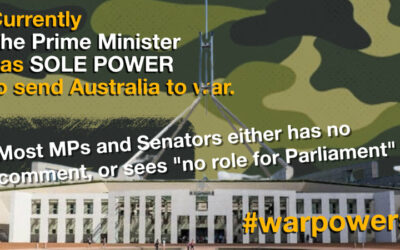The drums of war are banging as the debate over the AUKUS submarine deal reveals deep divisions about what Australia’s role should be in a US conflict with China. But what do the people of Australia think? And should they have a say? War Powers reform remains just talk but is more urgent than ever, Zacharias Szumer reports.
If climate change, inflation and the housing and financial crises weren’t stressful enough, the drums of war are now banging clear and bright. The AUKUS submarine deal has been sealed, and not a moment too soon for the media’s favourite geostrategic hawks, who believe that war with China could be as little as three years away. To rise to the occasion, the reintroduction of conscription should be considered, say some of these same experts.
This has not been met with welcome by the many Australians – possibly a majority – who think that the country should remain neutral in the event of China invading Taiwan. Whether this sentiment would be reflected in the parliamentarians who represent them is another question.
In some ways, though, that’s a purely theoretical question.
Wars in Australia are almost never voted on. No parliamentary vote was ever held for the wars in Iraq and Afghanistan – at least, not one whose results were respected. Not least because of how those conflicts turned out, some believe that increasing democratic control of the military is vital to preventing another catastrophic war being foisted upon the Australian public and the soldiers who would have to fight it.
The War Powers Inquiry
Unbeknownst to many Australians, a parliamentary inquiry is currently examining this very question. After years of persistent advocacy from groups like the Australians for War Powers Reform (AWPR), Labor committed to holding the inquiry if it won office – and it made good on that promise late last year.
However, the hopes of pro-reform advocates were deflated by Defence Minister Richard Marles coming out against their desired reforms before the inquiry even began. Similar sentiments were expressed by the deputy chair of the Joint Standing Committee on Foreign Affairs, Defence and Trade’s defence subcommittee, Andrew Wallace (Lib), which is handling the inquiry.
Nonetheless, the “Inquiry into International Armed Conflict Decision Making” went ahead, investigating “parliamentary processes and practices, including opportunities for debate to provide greater transparency and accountability on the deployment of the ADF”, as well as any security implications for these changes. It received over 100 submissions and held a single day of hearings in December last year. MWW provided some coverage of the hearings, and the full transcript is available here.
In his referral letter, Marles asked the committee to report by February 2023, but as of yet no report is forthcoming, and the committee has so far given no indication of when it is planning to release its final report. The inquiry’s listed media contact has so far not responded to MWM’s request for information on this front. But people with knowledge of the inquiry have told MWM that the inquiry is expected to report in late March.
Democracy vs Alliance
The Department of Defence’s submission to the inquiry argued that parliamentary approval “could undermine the confidence of our international partners as a reliable and timely security partner in support of regional and global stability, with significant diplomatic impacts.” Similar arguments were made by members of the Australian Strategic Policy Institute (ASPI) during the hearings.
In response, professor Clinton Fernandes – a former ADF intelligence officer now stationed at the University of NSW’s Future Operations Research Group – said “I hope they don’t mean that, just as Britain has the Gurkhas, the Americans have us. If that’s what they mean, then their view should be rejected in favour of Australian sovereignty and parliamentary authorisation.”
Although Defence would no doubt avoid such direct language, it’s hard to interpret that passage in any other way. Essentially, Defence seems to be arguing that our alliance with the US would be undermined by Australians exercising greater democratic control over their military. On one hand, this seems counterintuitive, given that the vast majority of Australians support the Australia-US alliance. On the other hand, perhaps the department understands the lack of popularity for a war with China, and the importance that joining such a war might have for remaining in America’s good graces.
In a recent opinion piece in The Age, Fernandes warned of the risks of remaining joined at the hip with a US administration that may become “an illiberal, unreliable power that changes its stance from one administration to another”. He recommends parliamentary authorisation before military deployments to preserve Australian sovereignty:
“Governments need no prior authorisation when faced with a war of necessity. But wars of choice and other overseas military deployments are an entirely different matter, as other US allies, including Norway, Germany and the Netherlands, recognise. The Australian parliament and people must remain in control, especially because of the geopolitical traps that lie in wait.”
War Powers Inquiry: “just as Britain has the Gurkhas, the Americans have us?”
A parliamentary peace?
So, would a parliamentary vote decrease the likelihood of Australia’s commitment to US-led wars? Not everyone thinks so.
Anthony Bergin from ASPI – who appeared as a witness at the inquiry’s December hearing – has written that “there’s not a single example” in which a binding parliamentary vote would have changed a decision on Australia’s commitment to send our troops to war”. Using Iraq as an example, Bergin says that, because Howard had a strong majority in the House of Representatives, a vote wouldn’t have changed the decision.
While the Senate passed a vote of no confidence in Howard in February 2003, it had no formal consequences.
In that vote, Labor voted against the Coalition. Today, such stark foreign-policy division between the two major parties seems less likely. As Paul Keating argued at the National Press Club last week, Labor is “on a unity ticket to deny the Liberals any wedge on foreign policy and defence.”
If he’s right, it’s hard not to see Labor MPs voting to join a US-led war against China – should such a hypothetical vote ever be held. Given that opposition leader Peter Dutton has recently said it “would be inconceivable” that Australia wouldn’t join the US if it took military action to defend Taiwan, it’s probably safe to presume Coalition support.
However, Labor is still comparatively reticent on what it would do in such a scenario. On Insiders over the weekend, Marles said it was just “plain wrong” that the AUKUS deal indicated that Australia would join the US in the event of a conflict over Taiwan. Marles specifically directed ire at “conjecture from a number of commentators” about such a bilateral understanding.
Presumably, one of these commentators was Hugh White – one of Australia’s most eminent defence and strategic policy experts – who recently warned that there was:
“…absolutely no way that a US administration would sell their scarce nuclear-powered attack submarines, of which they have fewer than they need … unless they were absolutely sure that in the event of a major conflict in Asia – conflict with China – that Australia’s submarines would be available to them.”
Accountability over outcome
AWPR president Alison Broinowski told MWM that the results of a hypothetical vote in the House would be dependent on whether the war was in response to an attack or was “an expeditionary war of choice”:
“An attack or incident involving US or Australian military assets in the region could be real or contrived. The results of a vote in Parliament would depend on what was revealed about it. So, the consequences of transferring the war powers to Parliament would depend on the particular case for war.”
In any case, if Australia had parliamentary war powers, the Australian military could serve knowing they had a mandate from the Australian people, she said. Given the number of parliamentarians who vote strictly along party lines, she added that such a mandate would be further enhanced by a conscience vote,
We just want all politicians to be involved, and responsible to their electorates for the outcome.
If such a deployment had to pass the Senate – where the Greens currently control the balance of power – then the equation also changes. It’s for this reason that some who spoke at the inquiry – including figures from ASPI and the Australia Defence Association – expressed strong concerns about the Senate being involved.
Even Labor’s Julian Hill, who has broadly supported the inquiry, previously told MWM that a bicameral vote would “risk national security being subject to nutters or popularists on the senate crossbench.” Although the word “popularist” is often used pejoratively in political discourse, it can also simply mean doing things that are actually popular with the public. And a vote against sending troops to the Indo-Pacific might fit that description.
A 2022 Lowy Institute poll found that 51 percent of Australians think the country should remain neutral in the event of a war between China and the US. However, this is down from 57 percent in 2021. A 2022 poll from YouGov found that less than half of Australians – 46 percent – thought that Australia should “send military forces to help the United States defend Taiwan”. Whether those numbers would change under a Trump or DeSantis presidency is also an open question.
Reform, say vets who know the horrors of war, yet most politicians say status quo
Zacharias Szumer is a freelance writer from Melbourne. In addition to Michael West Media, he has written for The Monthly, Overland, Jacobin, The Quietus, The South China Morning Post and other outlets.
He was also responsible for our War Power Reforms series.










